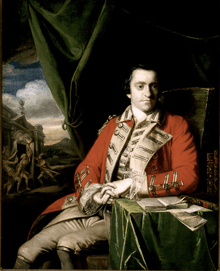Bernard Hale
Sir Bernard Hale (1677-1729) was an English-born barrister and judge who became Chief Baron of the Irish Exchequer. Two of his sons became Generals in the British Army.[1]
Background
He was born at King's Walden, Hertfordshire, the eighth son of William Hale and his wife Mary Elwes. The Hale family, who originally made their fortune as grocers in London, had owned property in King's Walden since the sixteenth century,[2] and Bernard's own descendants were still living there in Victorian times.[3] His father William was the son of Rowland Hale, High Sheriff of Hertfordshire in 1648, and was himself a political figure of some consequence, being MP for Hertfordshire in the English Parliament of 1679 and in the short-lived Parliament of 1681. His mother Mary was the daughter of Jeremy (Jeremiah) Elwes of Roxby, Lincolnshire.
Bernard was educated at Eton College and Peterhouse, Cambridge, graduating Bachelor of Arts in 1699 and Master of Arts in 1702: he subsequently became a fellow of Peterhouse.[4] He entered Gray's Inn in 1699 and was called to the Bar in 1705. He became one of the leaders of the English Bar, and was one of its top earners. He later transferred to Lincoln's Inn, and was briefly one of its Benchers.[5]
Family
He married Anne Thoresby of Northampton: they had seven children including:-
- General Bernard Hale (died 1798),
- General John Hale, Governor of Londonderry (died 1806),
- William Hale,
- Richard Hale,
- Jane Hale, who married Martin Madan; her portrait was painted by Allan Ramsay.[6]

Irish career
In 1722 he was appointed Chief Baron of the Irish Exchequer, and earned a good reputation in Ireland for integrity and efficiency.[7] In 1725 he and his junior Baron, Sir John St Leger, narrowly escaped death when on assize at Monaghan: the roof of Monaghan courthouse, which like many Irish courthouses of the time was in an appalling state of repair, fell in, narrowly missing the judges, who adjourned outside and continued the assize.[8]
Later the same year, it was rumoured that he was to be appointed Lord Chancellor of Ireland.[9] In fact he was offered the office of Lord Chief Justice of Ireland: but his English colleagues advised him to refuse it, on the ground that he would shortly be offered a place on the English Bench. Hale admitted that the prospect of being Irish Lord Chief Justice was tempting enough to "perplex him", but his great concern was to go back to England. Although he had been happy enough in Ireland, he admitted that "it is impossible for me to forget England or not to wish to return there".[10]
Last years
He went back to England as a Baron of the Exchequer: to qualify for that office he was made a Serjeant-at-law, and received a knighthood.[11]
He died at Red Lion Square, London in 1729 and was buried at King's Walden.[12]
References
- ↑ Ball, F. Elrington The Judges in Ireland 1221-1921 London John Murray 1926
- ↑
 Rigg, J. M. (1890). "Hale, Bernard". In Stephen, Leslie; Lee, Sidney. Dictionary of National Biography. 24. London: Smith, Elder & Co. p. 17.
Rigg, J. M. (1890). "Hale, Bernard". In Stephen, Leslie; Lee, Sidney. Dictionary of National Biography. 24. London: Smith, Elder & Co. p. 17. - ↑ Baker, J.H. "Bernard Hale" Oxford Dictionary of National Biography
- ↑ Baker
- ↑ Baker
- ↑ http://thepeerage.com/p47082.htm#i470817
- ↑ Ball Judges in Ireland
- ↑ Ball
- ↑ Ball
- ↑ Baker
- ↑ Baker
- ↑ Rigg p.17